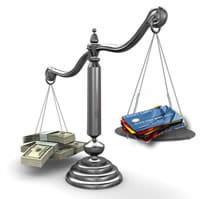 Last Thursday, I talked about balancing debt repayment with building an emergency savings fund. This is the second part of that post.
Last Thursday, I talked about balancing debt repayment with building an emergency savings fund. This is the second part of that post.
For the actual pay debt repayment, there are two ways to do this.
If you are the type of person that needs to see forward movement to keep you motivated, then pay off the smallest credit card balance first, then work your way to the next smallest until you’re done. This will give you a feeling of reward and the financial momentum to keep this going.
If paying interest rates and fees bothers you, you will want to pay off the highest interest rate credit card first and then work your way down to the lowest interest rate. You will have the satisfaction of paying less and less in interest charges each month.
Either way excessive credit card debt is the enemy of your budget.
Live within your means.
Because your credit is so important to your finances, you will have to find a way to live within your means. That means only using your credit cards when you know that you can pay them off in full each and every month.
So many people struggle with credit card debt. Just as they get their debt paid off, something happens and they are in debt again. You can use your cards for the consumer protections and to keep a healthy credit score, but learn to use your credit cards the way you would a check or debit card – keep your purchases within your monthly cash flow.





 While you’re doing your taxes this month, you can be assessing your finances and looking for ways to save. Here are some tips that might save you money on your car insurance:
While you’re doing your taxes this month, you can be assessing your finances and looking for ways to save. Here are some tips that might save you money on your car insurance: The holidays are long over and the new year is here. It’s time to clear clutter and get organized! With tax season underway, you can start shredding papers.
The holidays are long over and the new year is here. It’s time to clear clutter and get organized! With tax season underway, you can start shredding papers.
